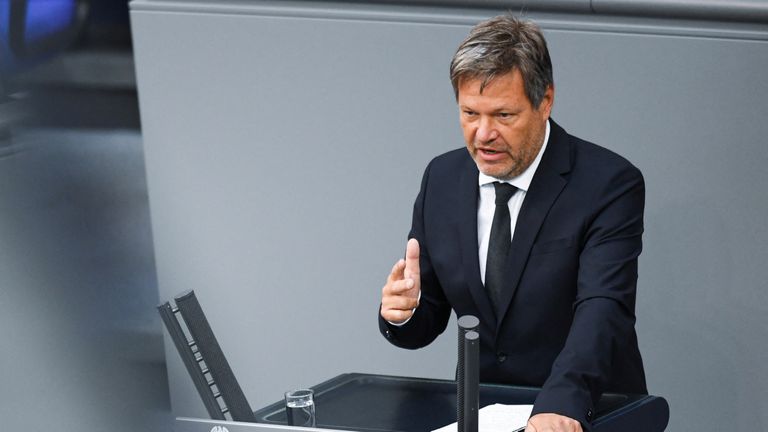How outburst from head of German stock exchange Theodor Weimer set business community ablaze


There has been much soul-searching and agonising during recent years over the valuation of the UK stock market – intertwined with a debate over London’s ability to attract world-class businesses to list here.
Even though the FTSE-100 has hit several record highs so far in 2024, the UK’s premier stock index is still trading at a significant discount to its global peers.
The FTSE-100 is currently trading on a price/earnings ratio – a valuation measure widely used by equity investors – of 14.78 times, according to Refinitiv data, compared with one of 15.71 for the pan-European Stoxx 600 and one of 24.7 for the S&P 500, the main US stock index.
But the UK is not the only European economy where concerns are being expressed about the relatively lowly valuation applied to its stock market.
German business has been set ablaze after a speech made nearly two months ago by Theodor Weimer, the outgoing chief executive of Deutsche Boerse, surfaced at the weekend.
Addressing the Bavarian Economic Advisory Council on 17 April at Munich’s luxury Bayerischer Hof hotel, Mr Weimer said he had just had his 18th meeting with Robert Habeck, Germany’s vice chancellor and economics minister.
He told his audience: “And I can tell you, it’s a sheer disaster.”
Mr Weimer said that, when Mr Habeck had come to office, he had been encouraged by the minister’s preparedness to listen to him – but said that enthusiasm had now dissipated.
In a no-holds-barred attack on Germany’s coalition government, Mr Weimer criticised not only its economic policy but its attitudes towards immigration and innovation.
Advertisement
He added: “We are on the way to becoming a developing country.”
Read more business:
Barclays branches targeted by pro-Palestine activists
Water company boss donates bonus to customer scheme
Cineworld plots blockbuster sale of British cinema operations
Mr Weimer, a former investment banker who has been CEO of Deutsche Boerse since 2018, said this was not only his opinion but those of major international investors he speaks with.
He added: “Our reputation in the world has never been as bad as it is now. Never before.”
Mr Weimer said that he had been asked by investors in Singapore what kind of government Germany was putting up with while, elsewhere, he said people “just shake their heads and wonder where the German virtues have gone”.
He said the only investment in German stocks was being made “opportunistically” because its market was so cheap.
He went on: “We have become a junk store.”
Not the first outburst
It is not the first time Mr Weimer, who is renowned for his plain speaking, has bemoaned the lowly rating on Germany’s stock market.
He has drawn attention several times in the past to the risk of European stocks moving their main listing to the US – something that has also alarmed City figures following the decision of companies like Ferguson, CRH and Flutter Entertainment to move their primary stock market listing from London to New York.
But this speech saw Mr Weimer widen his comments to a broader critique of the government – and one which is shared by many in Germany’s business community.
It includes “destroying” the country’s car industry, long a source of industrial prestige, by insisting on the phasing out of new petrol and diesel vehicles and refusing to subsidise the energy transition in the way the Biden administration has in the US.
Other criticisms include what he described as an “orientation towards do-gooderism” in migration policy and encouraging working from home and promoting work-life balance over the traditional German virtue of diligent work.
Mr Weimer also complained that the government’s “economic policy lacks a compass” and said excessive government bureaucracy and interference in the economy was patronising to ordinary Germans.
He added: “Damn it, I don’t want to be protected by this government.”

Keep up with all the latest news from the UK and around the world by following Sky News
Reaction to the speech has been mixed.
Verena Hubertz, an MP in the SPD – the biggest party in the coalition government – told the Financial Times: “The bizarre speech is more beer tent than Dax-listed company executive.”
But Sarna Roeser, one of Germany’s most celebrated young entrepreneurs, told the newspaper Die Zeit that, as someone who travels abroad widely, she had also heard similar comments from international investors.
She added: “With ideological left-green politics, moral finger-pointing and feminist foreign policy, Germany will no longer be taken seriously at home or abroad and will continue to slide.”
Mr Weimer, whose €10.6m pay package in 2023 made him Germany’s second best-paid CEO after Ola Kaellenius of Mercedes-Benz, may have felt emboldened to speak because he is about to step down.
There is little doubt, though, that in attacking chancellor Olaf Scholz’s government, he has said publicly what many German business people are saying privately.
And to judge by the spanking Mr Scholz’s coalition received in the European parliament elections at the weekend – Mr Habeck’s Green Party did particularly badly – many ordinary German voters seem similarly disgruntled.